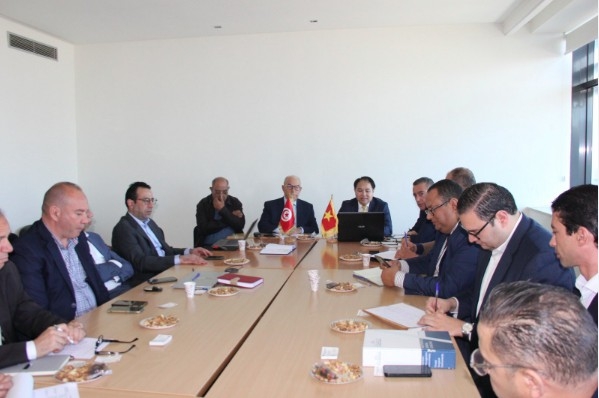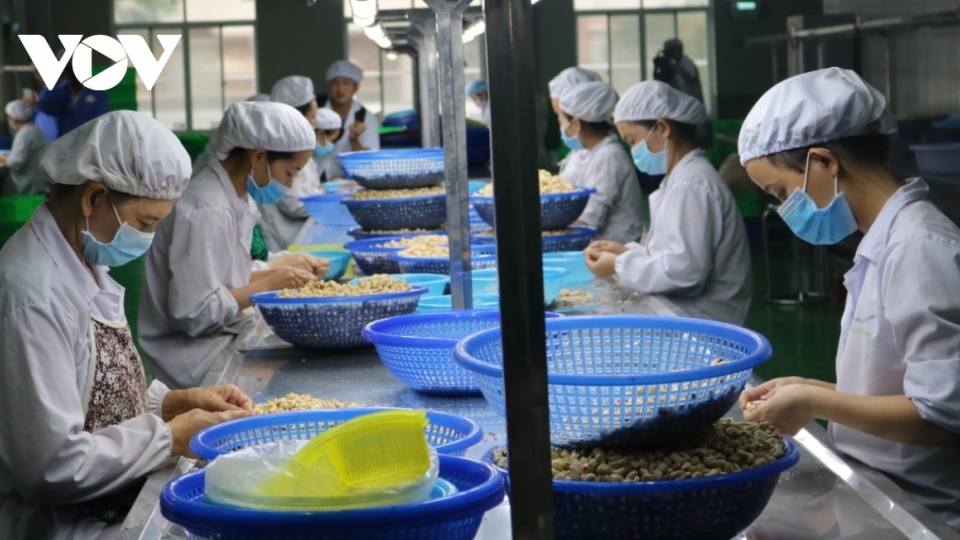Vietnam and Tunisia strengthen economic and trade ties
VOV.VN - The Vietnamese Trade Office in Algeria, responsible for Tunisia recently coordinated with the Tunisian Union of Industry, Trade and Handicrafts (UTICA) to organize an online trade meeting with a view to connecting businesses from both countries and promoting bilateral economic and trade cooperation.

The event attracted 60 delegates from various ministries, sectors, and businesses of both Vietnam and Tunisia.
As part of his visit to Tunis from April 22-26, Vietnamese Trade Counsellor in Algeria Hoang Duc Nhuan held a host of meetings with the leaders of the Arab and ASEAN Cooperation Department, the Trade Department under the Ministry of Commerce and Export Development, the Asia Department of the Ministry of Foreign Affairs, Migration, and Tunisians Abroad, the Tunis Chamber of Commerce and Industry, and UTICA to discuss trade cooperation and measures to enhance bilateral relations.
Speaking at the online trade meeting on April 24, Mohamed Koolie, Vice President of UTICA, praised the potential for cooperation between the two countries, emphasizing that this was a great opportunity to connect the business communities and suggested organizing at least two trade meetings every year.
With a population of approximately 12.5 million and a strategic location close to Europe (140 km away), Tunisia is one of the most dynamic and internationally integrated economies in the Arab-African region. Its participation in numerous free trade agreements, particularly the African Continental Free Trade Area (AfCFTA), has made Tunisia an important gateway for Vietnamese goods to enter the North African and Arab markets.
According to statistics, in 2024, the bilateral trade turnover between Vietnam and Tunisia reached US$267 million, nearly three times higher than in 2023. Vietnam primarily exports footwear, raw coffee, pepper, cashew nuts, seafood, and machinery, while importing from Tunisia products like seafood, dates, chemicals, and animal feed ingredients.
Tunisia has a large demand for imports, especially for key items such as raw coffee (30,000 tons per year, mainly robusta), rice (30,000 tons per year), and sugar (360,000 tons per year). Under current regulations, these products are mainly imported through the Tunisian Trade Department. However, since 2024, Tunisia's law allows some private enterprises to participate in the import of these products, opening up more opportunities for foreign businesses, including those from Vietnam.
At the meeting, the Vietnam Trade Office introduced the economic-trade situation and Vietnam's import-export policies, also informing Tunisian businesses about major international trade events such as the Vietnam International Sourcing Expo, the Vietnam Food Expo, and the Vietnam Expo in 2025, inviting Tunisian partners to participate and explore cooperation opportunities.
From a legal perspective, Vietnam and Tunisia have signed several important agreements such as the Trade Agreement (1994), the Economic, Cultural, and Scientific Cooperation Agreement (1999), the Framework Agreement on Agricultural Cooperation (2002), and the Double Tax Avoidance and Prevention of Tax Evasion Agreement (2010), creating a favorable legal framework for bilateral trade and investment exchanges. The two countries have also held three sessions of the Intergovernmental Committee, the most recent of which took place in Tunis in April 2018.
At the meeting, Mohamed Koolie expressed his admiration for Vietnam’s trade turnover of US$786.29 billion in 2024 and stated that he would consider organizing a delegation to Vietnam to attend major trade fairs and exhibitions in 2025.
He also called on businesses from both sides to actively explore each other's key products to step up cooperation on a mutually beneficial basis and invited Vietnamese businesses to consider investment, joint ventures, and partnerships with Tunisian counterparts in sectors such as food processing, new technologies, and marine fish farming to take advantage of Tunisia’s strategic location, rich resources, modern infrastructure, skilled labor, and potential for exports to other countries in the region.
However, Tunisian businesses also raised some challenges, such as the rising prices of some Vietnamese export items (coffee, pepper), increased shipping costs due to the Middle East conflict, issues of trust in business, and high import taxes on dates into Vietnam. Some delegates suggested that the governments of both countries need to create policies to facilitate the entry of goods into each other's markets through negotiations to reduce import taxes, propose signing a preferential bilateral trade agreement, and establish a Vietnam-Tunisia Business Council to promote substantial and sustainable cooperation.
On this occasion, the Vietnam Trade Office displayed product catalogs and samples from Vietnamese businesses and organized a product introduction of Vietnamese coffee to Tunisian partners. Several Tunisian businesses have found potential partners for negotiating the import of coffee, rice, powdered milk, mechanical products, and consumer goods, as well as the export of dates, olive oil, and seafood to the Vietnamese market.
Both sides consented to bolster cooperation in organizing trade promotion activities, exchanging business delegations, showcasing each country's strengths and potential, supporting businesses in participating in international trade fairs and exhibitions, and collaborating to resolve any trade disputes that may arise.



